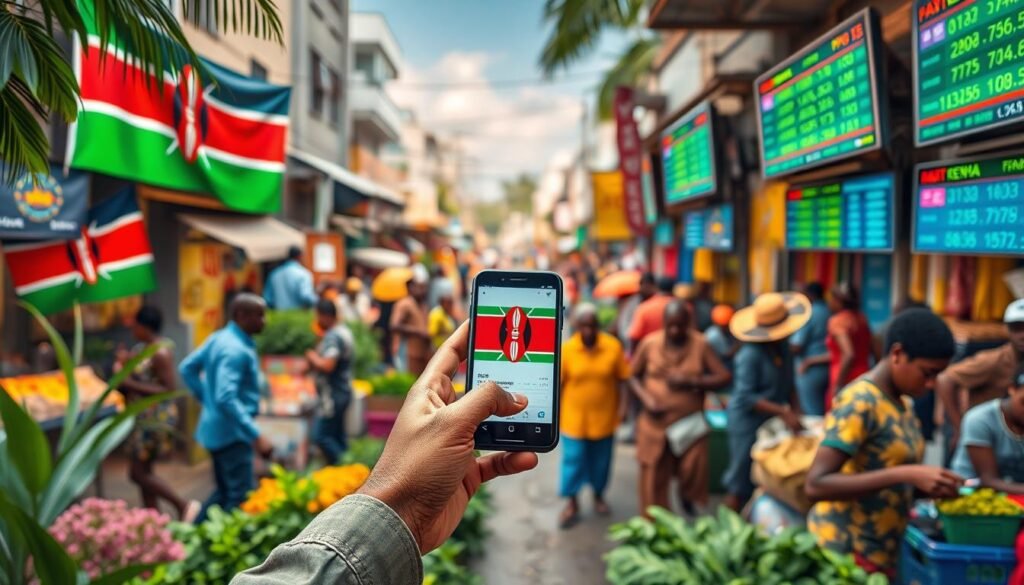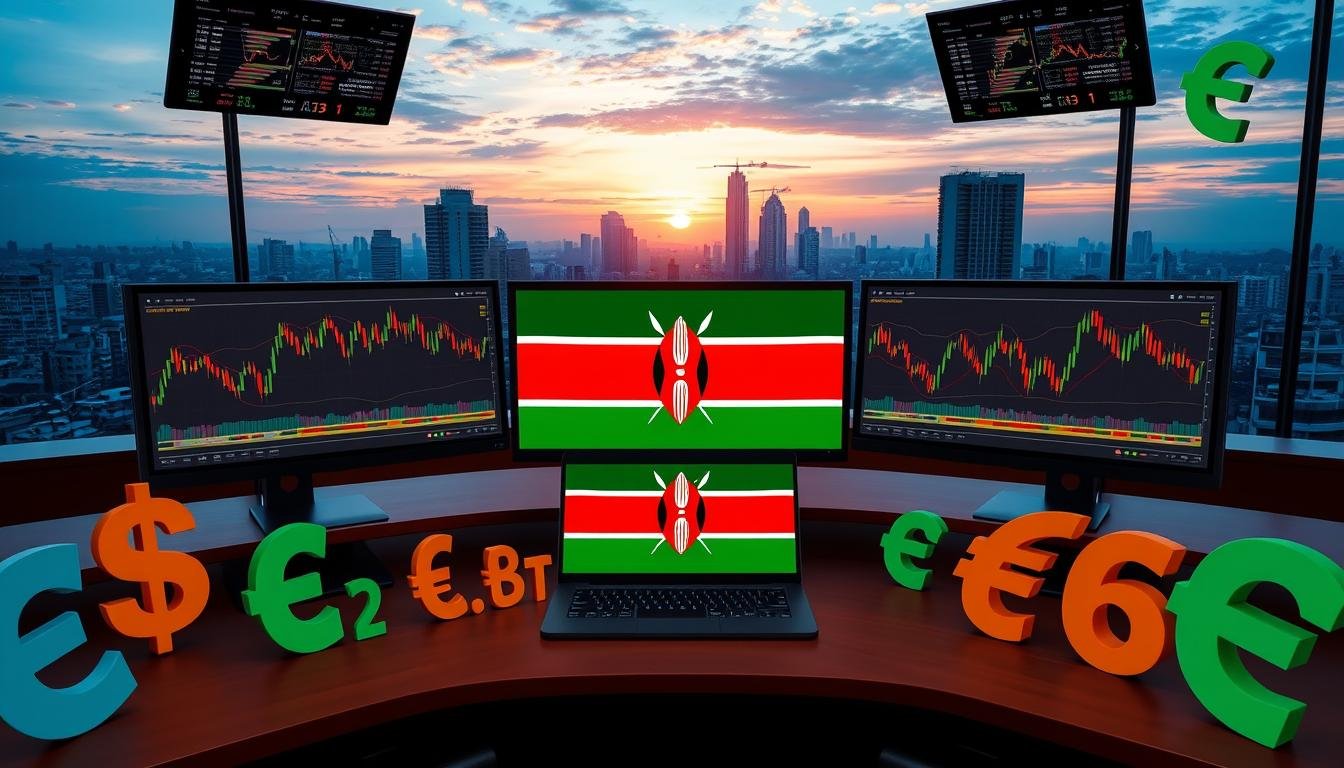Forex Trading Kenya: Your Guide to Currency Markets
Welcome to the exciting world of Forex trading in Kenya. Here, the rhythm of currency trading beats with the global economy’s pulse. The Kenyan shilling is actively traded, drawing more Kenyans into the foreign exchange market.
This market, where trading currency pairs is both a science and an art, has seen a big increase. This growth is thanks to technology and changes in regulations. We’ll look at how Forex trading in Kenya is changing and the chances it offers for smart traders.
Key Takeaways
- Insight into the burgeoning field of currency trading Kenya and its benefits for traders.
- A comprehensive overview of how the foreign exchange market operates within the Kenyan context.
- Understanding the impact of technological advancements on the accessibility of Forex trading.
- Recognition of the importance of the Kenyan shilling in the realm of trading currency pairs.
- An introduction to the regulatory changes shaping the future of Forex trading in Kenya.
Understanding Forex Trading Basics
For those new to the financial markets, Forex trading for beginners can seem complex. The FX market is a global place where currency pairs are exchanged. This constant flow of buying and selling offers opportunities for profit, especially for those who understand market dynamics.
First, it’s important to know what currency pairs are. A currency pair is made of two currencies in a foreign exchange transaction. One is the base currency, and the other is the quote currency. Trading these pairs well needs foresight and knowledge of market conditions.
- Major pairs involve the most traded currencies worldwide, including USD, EUR, and GBP.
- Minor pairs include less dominant currencies but still offer significant trading opportunities.
- Exotic pairs pair a major currency with a currency from a smaller or emerging economy.
When trading in the FX market, traders place buy and sell orders. Buy orders are for when a trader thinks the base currency will get stronger against the quote currency. Sell orders are for when the base currency is expected to get weaker.
To help with these predictions, traders use technical and fundamental analysis. Technical analysis looks at charts and historical data. Fundamental analysis looks at economic indicators and news events that might affect currency values.
Knowing how these elements work together in the FX market can really help beginners in Forex trading.
The Evolution of Forex Trading in Kenya
The Forex market history Kenya shows a story of economic strength and smart changes. Forex trading in Kenya has grown from a small activity to a big part of finance. This growth came from new rules and better technology.
At first, only big banks and experienced investors traded Forex in Kenya. But, with open markets and digital tools, more people can trade. Now, Kenyan traders use online platforms with real-time data and tools for analysis. This helps both new and experienced traders.
- Increased awareness and education on Forex trading.
- Enhanced regulatory frameworks promoting investor protection.
- Adoption of mobile technology, allowing traders to execute trades from anywhere at any time.
This change is not just about more people trading. It also shows how Forex trading has helped Kenya’s economy. It has made personal finance and investing more interesting for Kenyans. It shows they are now part of the global economy.
Choosing the Right Forex Broker in Kenya
Starting in the Forex market in Kenya means picking a good broker first. This choice can really affect your success and safety. Look at things like if they follow the rules, their fees, and if they have cool trading tools.
Regulatory Framework and Safety
First, check if the broker is regulated by the CMA. This means they follow strict rules and keep your money safe. It’s key to choose brokers who are open and follow the law to avoid risks.
Comparing Broker Fees and Spreads
Knowing how much Forex brokers in Kenya cost is important. Spreads, or the price difference, can impact your earnings. Look at spreads and fees to save money and make more.
| Broker | Spread | Trading Fees |
|---|---|---|
| Broker A | 0.8 pips | No fees on deposits |
| Broker B | 1.2 pips | Low withdrawal fees |
| Broker C | 0.6 pips | Zero commission on trades |
Assessing Trading Platforms and Tools
Good Forex platforms make trading easier and come with tools to help you decide. Look at what tools they offer and how easy they are to use. The best platforms work well for both new and experienced traders.
By carefully thinking about these points, you can find a Forex broker in Kenya that fits your needs. It will help keep your investments safe and growing.
Developing a Solid Forex Trading Strategy
For traders in the forex market, a strong strategy is key. This part covers the main techniques for making such strategies. We focus on technical and fundamental analysis, and risk management to help traders make smart choices and keep their investments safe.
Technical Analysis for Predicting Market Trends
Technical analysis is a vital part of good Forex strategies. It looks at past market data, like price and volume, to guess future trends. Traders use tools like charts and indicators to spot patterns that hint at future market moves.
Fundamental Analysis: Economic Indicators to Watch
Fundamental analysis is also crucial for Forex strategies. It deals with economic factors that affect currency values. This includes GDP, employment, and interest rates. By understanding these, traders can predict market changes based on economic conditions.
Risk Management Techniques in Forex Trading
Managing risk in Forex is essential to protect investments. It means setting risk/reward goals, using stop-loss orders, and controlling leverage. A good risk management plan helps limit losses and keeps investments going for longer.
Forex Trading Education and Resources
Starting your Forex trading journey in Kenya needs more than just excitement and hard work. You also need a solid education foundation. With top Forex education in Kenya, you can improve your skills and knowledge greatly. It’s important to check out different trading courses, join Forex webinars, and read Forex literature to keep up with the market’s fast pace.
Online Courses and Webinars
For beginners or those wanting to learn more, there are many online trading courses in Kenya. These courses are for all levels, from beginners to experts. Also, Forex webinars offer a chance to learn from experts and get answers to your questions in real-time.
Books and E-books for Forex Traders
There are countless books and e-books for Forex traders. They cover important topics like market analysis, trading strategies, and the psychology of trading. Key books focus on technical and fundamental analysis, which are vital for Forex success.
Forex Trading Kenya: Understanding Market Dynamics
The Kenyan Forex market is shaped by many global and local economic drivers. It’s key for traders to know these factors to handle currency trading fluctuations well. Here’s a look at how these economic forces work together, impacting the market.
In the Kenyan Forex market, important economic signs greatly influence currency values. These include inflation rates, GDP growth, and export-import data. All these are big economic drivers that can lead to currency trading fluctuations.
Knowing how global economic trends meet local events in Kenya is key to predicting market shifts.
Let’s dive into how different global and local events affect the Kenyan Forex market.
| Economic Driver | Impact on Kenyan Forex Market |
|---|---|
| Global Commodity Prices | Rises in commodity prices make the Kenyan currency more valuable since Kenya exports a lot of commodities. |
| Political Stability | Political events can cause big swings in the market as traders worry about policy changes. |
| Interest Rate Changes | Changes in interest rates by the Central Bank of Kenya can either attract or scare off foreign investors, affecting currency value. |
| Global Economic Outlook | A good global economic outlook boosts investor confidence, making local currencies more valuable. |
For traders in the Kenyan Forex market, knowing about these economic drivers is crucial. Understanding and predicting currency trading fluctuations can make all the difference between success and failure in Forex trading.
Practical Tips for Successful Forex Trading
Starting your journey in profitable Forex trading Kenya is more than just knowing the market. It’s about having Forex trading discipline. Here are some tips that use Forex best practices to improve your trading skills and results.
- Set Clear Goals: Before you start trading, have clear goals in mind. This helps you pick the right strategies and manage your money well.
- Develop a Trading Plan: Good trading comes from a solid plan. This plan should include when to enter and exit trades, how to manage risks, and how to check your progress.
- Maintain Psychological Equilibrium: Successful traders don’t let emotions guide their decisions. It’s important to stay calm and in control.
- Continuously Educate Yourself: The market changes, and so should your knowledge. Stay updated with financial news and Forex trading advancements.
Let’s look at how these practices affect traders. A comparison between disciplined and undisciplined traders shows the difference:
| Criteria | Disciplined Traders | Undisciplined Traders |
|---|---|---|
| Success Rate | Higher | Lower |
| Risk Management | Efficient | Poor |
| Emotional Decision Making | Low | High |
| Profitability Over Time | Stable Growth | High Fluctuations |
By following these tips, you can increase your chances of success. You’ll also stand out as a serious trader in Kenya’s Forex market. Remember, being consistent is crucial for long-term success in Forex.
The Role of Technology in Forex Trading
Forex trading is getting more popular in Kenya, thanks to Forex technology. Now, traders have tools that were once only for big institutions. Automated Forex systems and mobile Forex trading platforms have changed how Kenyans trade.
Automated Trading Systems
Automated Forex systems have changed trading. They can analyze data, spot signals, and make trades fast. This means less error and more profit for traders.
These systems keep getting better. They use smart algorithms that learn from new data and market changes.
The Importance of Mobile Trading in Kenya
Mobile Forex trading in Kenya makes trading easy. Traders can trade from anywhere, anytime. This is great for Kenya’s mobile users.
Mobile platforms offer real-time data and tools for analysis. These are key for making smart trading choices.
| Feature | Benefits | Impact on Trading |
|---|---|---|
| Real-Time Market Access | Traders can react quickly to market changes. | Improved responsiveness to volatile market conditions. |
| In-App Analysis Tools | Allows for on-the-go analysis and decisions. | Enhances decision-making efficiency. |
| Automated Trading Options | Enables setting pre-defined trading conditions. | Reduces emotional trading and increases strategy adherence. |
Forex technology through automated systems and mobile platforms helps both new and experienced traders. As tech gets better, trading tools will too. This promises a great future for Forex in Kenya.

Forex Trading Risks and How to Avoid Them
Forex trading comes with risks, making Forex risk management key to avoid losses. It’s important to know these risks to create strategies for avoiding Forex losses. This ensures success in the markets over time.
Forex trading hazards include market volatility and misuse of leverage. Good risk management helps traders deal with these issues. It protects their investments. Here, we’ll talk about the main risks in Forex trading and how to handle them.
- Leverage Risk: Leverage can increase both profits and losses. It’s crucial to use it wisely, sticking to safe ratios and watching market volatility.
- Interest Rate Risk: Forex values change with global interest rates. Keeping up with central bank news helps predict market shifts.
- Transaction Risk: This risk comes from the time gap between starting and settling a trade. To avoid it, trade quickly and don’t hold positions for too long.
Also, using stop-loss orders is a smart move. It helps protect against sudden market changes, helping to avoid Forex losses.
While Forex trading hazards are part of trading, they can be managed. With the right knowledge and strategies, they can even work in your favor.
Kenyan Traders’ Success Stories
Looking into the paths of successful Forex traders in Kenya, we find many inspiring stories. Each one shares unique strategies and experiences. These stories not only show the traders’ skills but also guide those who want to start trading.
From Struggle to Success: Becoming a skilled trader takes a lot of hard work and smart moves. Traders from Kenya often talk about the need to stay strong and keep learning. They say this is key to getting good at trading.
| Trader | Strategy | Years of Experience | Key to Success |
|---|---|---|---|
| Mercy Wanjiku | Swing trading | 5 | Patience and timing |
| David Mutai | Scalping | 7 | Risk management |
| Esther Lumumba | Day trading | 4 | Market analysis skills |
Each story adds a brushstroke to the larger picture of Forex trading in Kenya, inviting others to take part in this lucrative endeavor.
“Persistence and continuous learning are the hallmarks of successful Forex traders Kenya,” notes Mercy Wanjiku, whose trading expertise has grown significantly over the years.
For those inspired by these success stories, the main lesson is clear. Success in Forex trading doesn’t come quickly. It takes a lot of effort, smart planning, and the ability to adjust to changing markets.
The Impact of Kenyan Economic Policies on Forex Trading
The link between Kenya economic policies and the Forex market impact is key for traders and investors. Knowing how government regulations affect currency value is vital for Forex success.
Recent changes in Kenya’s economic policies have big effects on Forex. Fiscal and monetary adjustments have changed currency strengths, impacting trading strategies.
Government actions in the Forex market try to keep the national currency stable. But, these actions can cause sudden market changes.
Think about how Forex reacts to strict financial rules. These rules aim to control inflation and stabilize the economy. But, they make the market more sensitive, affecting Forex prices and volumes.
- More regulation means higher costs for brokers, making it harder to enter the market.
- Changes in interest rates can cause currency values to swing unpredictably.
- Foreign investment is affected by trade policies and taxes.
Traders need to keep up with these changes to adjust their strategies. Analyzing Kenya’s economy and regulation shifts is crucial for Forex success.
The world’s view on Kenya’s economic stability also matters for Forex confidence. Good growth and strong policies make Kenya attractive for investment and trading.
Kenya’s economic policies and government regulations shape Forex trading in the region. This complex relationship means Forex market players must watch policy changes closely.
Common Forex Trading Mistakes to Avoid
Forex trading can be rewarding, but it’s full of common trading pitfalls that can hurt success. Knowing these pitfalls is key to improving trading skills and better performance.

One big Forex trading error is overleveraging. It means using too much leverage to get more returns, which can lead to big losses. This can quickly use up your trading money, especially if you don’t understand the market well.
- Lack of a comprehensive trading plan
- Ignoring the importance of risk management
- Emotional trading leading to rash decisions
- Failure to adapt to changing market conditions
Having a detailed trading plan can help avoid many risks. A good plan outlines strategies for when to buy or sell, how much to invest, and how to manage risks. This clear plan is vital for dealing with the Forex market’s ups and downs.
Getting better at trading means always learning and trying new things. Successful traders stress the need for ongoing education. They say it’s important to keep learning and using new tools to stay ahead in the market.
In summary, while Forex trading errors are common, they can be avoided with learning, planning, and caution. Knowing these common mistakes can help you avoid big losses. This can lead to more stable financial growth.
Demo Accounts: Practice Before Going Live
Starting in Forex trading is both thrilling and scary. That’s where Forex demo accounts help. They give you a simulated Forex experience that feels like real trading but uses fake money. It’s a great way for newbies to learn and feel confident without losing real money.
Forex demo accounts are key for learning trading skills. They let you practice trading in real-time market conditions. This is vital for building your ability to handle common mistakes in live markets.
- Understanding market movements
- Testing trading strategies
- Getting familiar with the trading platform’s tools and features
Using a Forex demo account helps you move from book knowledge to real-world skills. It’s important to take the simulated Forex experience seriously. This way, the skills you learn will be strong enough for real trading.
Staying Updated: Forex News and Analysis
To stay ahead in currency trading, it’s key to have the latest Forex market news Kenya and Forex analysis. Whether you’re new or experienced, using economic news and market insights in your strategy can improve your choices.
Staying updated helps predict market changes and understand big economic factors that affect Forex. Here’s how to keep up:
- Subscribe to top financial news services for live updates and deep Forex analysis.
- Follow financial news channels and websites that focus on economic news.
- Join online forums and discussion groups that share and talk about Forex market news Kenya.
- Use social media where experts share their market insights.
By regularly checking out important and timely info, Kenyan Forex traders can get better at the market. This is key for dealing with currency trading’s complex issues.
Remember, the difference between an average trader and a successful one often lies in the quality of information they have at their disposal.
With careful attention to Forex market trends, economic changes, and expert views, you’re set to make smart trading choices in the volatile Forex world.
Keep improving your sources and make sure they’re reliable. This active approach to staying updated not only protects your investments but also helps you reach your trading goals.
Diversifying Your Trading Portfolio
Forex trading benefits from trading portfolio diversity. It helps reduce risks and increase potential gains. A balanced portfolio spreads risk across different financial tools. It also lets traders take advantage of various market conditions.
Diversification is more than just having many trades. It’s about picking the right combinations for different situations. This balanced approach can balance losses with gains.
- A range of major currency pairs like USD/EUR for stability.
- Emerging market currency pairs for high reward potentials, albeit with higher risks.
- Exotic pairs that might provide unexpected opportunities if researched thoroughly.
A balanced portfolio makes your trading smoother, reducing risks from the forex market’s ups and downs. By mixing major, minor, and exotic currencies, traders get wide exposure to global markets. This is especially helpful during uncertain times.
Using tools and strategies to keep your portfolio in check is key. This proactive method helps manage risk and spot new opportunities. It makes currency pair diversification a flexible part of your strategy.
Conclusion
Forex trading in Kenya is a journey filled with learning, strategy, and understanding the market. This guide has covered the basics and the complex parts. It has helped you prepare for the world of currency trading.
Remember, the Forex market is always changing. To succeed, you must keep learning and adapting. A good trading plan, managing risks, and using new technologies are crucial. Always be careful and focused when trading.
This guide is a starting point for both new and experienced traders. It helps you understand Forex trading better. With this knowledge, Kenyan traders can make smart choices in the currency markets. We wish you success in Forex trading.
FAQ
What is Forex trading and how is it relevant to Kenya?
Forex trading, or foreign exchange trading, is about buying and selling currencies to make money. In Kenya, it’s becoming more popular. This is due to better technology and rules, making it a big part of the financial scene.
Can beginners easily start trading Forex in Kenya?
Yes, beginners can start Forex trading in Kenya. It’s important to know the basics of the FX market and how to buy and sell currencies. Many brokers offer help and practice accounts, so you can learn before trading with real money.
How has Forex trading evolved in Kenya over the years?
The Forex market in Kenya has grown a lot. This is thanks to global and local economic changes, more interest in finance, and better technology. These changes have made it easier for Kenyan investors to trade global currencies.
What should Kenyans look for when choosing a Forex broker?
When picking a Forex broker, look for ones regulated by the Capital Markets Authority (CMA). Check the fees and spreads. Also, make sure the trading platforms and tools meet your needs.
Why is it important to have a Forex trading strategy?
Having a Forex trading strategy is key. It helps you understand the market, predict trends, and manage risks. This way, you can make smart decisions and protect your investments.
Where can Kenyan traders find Forex trading education and resources?
Kenyan traders can find Forex education online, through webinars, and books. These resources are vital for improving your trading skills and knowledge.
What are the key market dynamics in the Kenyan Forex market?
The Kenyan Forex market is shaped by currency trading and economic factors. Both local and global events affect currency values and market stability. Knowing these dynamics is crucial for trading success.
What are some practical tips for profitable Forex trading in Kenya?
To trade profitably in Kenya, stay disciplined, patient, and strategic. Education and continuous learning are key. Understanding the market is also essential for success.
How are technology and mobile trading impacting Forex trading in Kenya?
Technology, especially automated systems and mobile trading, has changed Forex trading in Kenya. It makes trading more efficient and accessible, allowing traders to stay connected to the market anytime.
What risks are involved in Forex trading and how can they be avoided?
Forex trading risks include leverage, interest rate changes, and market volatility. To avoid these, use solid risk management, stay informed, and trade wisely, especially with leverage.
Who are some successful Forex traders in Kenya, and what can be learned from them?
Kenya has many successful Forex traders who share their experiences and strategies. Learning from their discipline, persistence, and risk management can greatly benefit new traders.
How do Kenyan economic policies influence Forex trading?
Kenyan economic policies and regulations impact the Forex market. They affect currency values and stability. Traders need to stay updated on these policies to predict market movements.
What common Forex trading mistakes should Kenyan traders avoid?
Traders should avoid over-leveraging, not having a trading plan, making emotional decisions, and underestimating risk management. These mistakes can harm your trading skills and lead to losses.
Why are Forex demo accounts important?
Forex demo accounts are essential. They let traders practice in a simulated environment. This helps them gain experience, test strategies, and build confidence without risking real money.
How important is it for Kenyan traders to stay updated with Forex news and analysis?
Staying current with Forex news and analysis is very important. It gives traders insights into market trends and economic events that can influence their trading decisions. Real-time updates and expert analysis can improve trading success.
What is the significance of diversifying a Forex trading portfolio?
Diversifying a trading portfolio spreads risk and reduces volatility impact. It involves trading different currency pairs and other financial instruments. This creates a balanced and resilient investment strategy.







